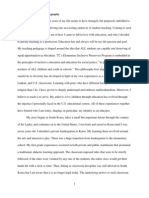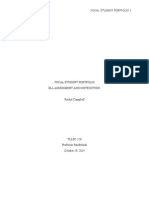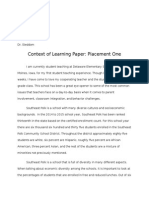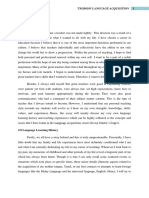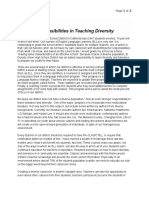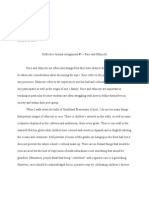Classroom Overview
Classroom Overview
Uploaded by
api-283707491Copyright:
Available Formats
Classroom Overview
Classroom Overview
Uploaded by
api-283707491Original Title
Copyright
Available Formats
Share this document
Did you find this document useful?
Is this content inappropriate?
Copyright:
Available Formats
Classroom Overview
Classroom Overview
Uploaded by
api-283707491Copyright:
Available Formats
Class Overview based on observations and data
Use readings from the past to describe your class of students:
Taylor & Whittaker; Bridging Multiple Worlds; Delpit; Nieto; Understanding Culture Brief; Hoeksema; Petersen & Hittie; Pearson
202 book; Woolfolk Chap 2, 3, 5; Levine
There is a lot of Hispanic culture at Cs Elementary and even in the community surrounding it. The
majority of students at the school are Hispanic. There are many small businesses surrounding the
school that are run by Hispanic people. Also, I often see many of the students walking to school
Culture
together in groups. This shows me the type of community that the students live in and how that cultural
aspect is often brought into the classroom.
Race & Ethnicity
Social SystemsPeers & Family
Moral, Spiritual, and
Faith Development
Attention & Memory
Language
Motor &
Spatial/Sequential
Ordering
Higher Order Thinking
Ability & Disability
Twenty of the twenty-three students in my classroom are Hispanic. Of those twenty, fifteen speak
Spanish in their house, and English is their second language. Of the three students left, two of them are
African American, and one is Caucasian. Many of the parents of the Hispanic students speak little to no
English.
Ms. F told me that most of the parents of her students work full time during the day. She also told me
that many of her students do not own winter coats, so they simply wear a lot of layers of shirts,
sweatshirts, and pants. This tells me that some of the families of the students in my class struggle
financially.
Cs Elementary is a public school so there arent many opportunities to talk explicitly about faith or
spirituality. Often, though, I will hear students talking about church, or they will write about church or
prayer in their responses to some of their reading. There is one boy who always says Amen, after I
get done reading a story. These small things that I observe tell me that many of the students in my
classroom come from religious families.
Only one student in my classroom has been officially diagnosed with ADHD. But there is one student
in the process of being diagnosed, and two students who show serious signs of attention deficits.
Communicating to the parents about students lack of attention is often difficult because they don t
speak English well so it is difficult for them to understand the concept. Ms. F said she has to spell it
out to the parents if she wants them to get their child tested. And often, even if she does that, they
ignore her suggestions and refuse to get their child tested.
For many of the students in my classroom, English is their second language. So far I had any problems
any of them understanding what Im saying. I think Cs Elementary does a good job of transitioning
their students from Spanish to English use in the classroom. I often hear the students speaking in
Spanish to each other. Sometimes when a student is distracted and Ms. F really wants to get a point
across, she will speak to that student in Spanish. I also work with students in small groups to improve
their fluency in reading. From my observations, it seems that students whose primary language is
English, tend to have better scores when I test them for fluency.
There are a few students in the classroom who still struggle to grip a pencil in the correct way and it
affects their handwriting. Ms. F provides those students with pencils that are fatter and have thicker led.
This helps students to have more control over their hand writing. The thicker led also keeps the tip of
the pencil from breaking as easily when the students press really hard.
Students are often asked to summarize what theyve read or are asked to pick out the difference
between fact and opinion from a given text. It seems that most of them struggle with this and really
needed assistance from either me or the teacher. These types of activities require a lot of higher order
thinking and I see most of the students struggling with that. There are other times they display a good
ability of higher order thinking. Such as when they work on their math. Many of them show great
ability to add and subtract numbers, and a few students have even moved on to multiplication, which
hasnt even been taught in second grade yet.
Because of the various races and ethnicities in the classroom, and the diverse home lives of many of the
students, there is a wide range of abilities. The reading ability of all the students ranges from a first
grade level to a fourth grade level. Because of this, students are split into reading groups according to
their level of ability, and are tutored in groups. There are no physical disabilities in the classroom.
Though there are various academic abilities among the students, each child is given a fair chance to
display his or her talents.
You might also like
- Year7 - Ancient China - Unit OverviewDocument15 pagesYear7 - Ancient China - Unit Overviewapi-237976105100% (2)
- Jennifer Kang - Student Teaching AutobiographyDocument5 pagesJennifer Kang - Student Teaching Autobiographyapi-242980775No ratings yet
- Four Kinds of Sentences-1Document2 pagesFour Kinds of Sentences-1Hartati56% (16)
- Ci 280 FinalDocument7 pagesCi 280 Finalapi-449524522No ratings yet
- New Supervisor Skills For SuccessDocument26 pagesNew Supervisor Skills For SuccessM Manjunath100% (1)
- Reflection Paper 2Document10 pagesReflection Paper 2Khristian RossNo ratings yet
- Classroom Profile-Legacy ChristianDocument2 pagesClassroom Profile-Legacy Christianapi-284183356No ratings yet
- Final Cip Jordan 2014Document38 pagesFinal Cip Jordan 2014api-253986464No ratings yet
- DiversityDocument16 pagesDiversityapi-314681869No ratings yet
- Focal Student PortfolioDocument38 pagesFocal Student Portfolioapi-293432552No ratings yet
- Final Unit PrefaceDocument7 pagesFinal Unit Prefaceapi-253146124No ratings yet
- Class ContextDocument2 pagesClass Contextapi-313893599No ratings yet
- Case Study: Student SeminarDocument19 pagesCase Study: Student Seminarapi-317921521No ratings yet
- Fam487 Thms JournalsDocument9 pagesFam487 Thms Journalsapi-347445701No ratings yet
- My Literacy Narrative - Nicholas VetriDocument6 pagesMy Literacy Narrative - Nicholas Vetriapi-608775651No ratings yet
- ContextoptionswordDocument2 pagesContextoptionswordapi-213637986No ratings yet
- ESL ConceptsDocument6 pagesESL ConceptsRebekah Mambiar50% (2)
- Edl 318 Paper 4-9-2015Document9 pagesEdl 318 Paper 4-9-2015api-285668067No ratings yet
- Sandra TovarDocument3 pagesSandra Tovarapi-318039237No ratings yet
- Midterm 2Document7 pagesMidterm 2api-517942506No ratings yet
- Context of Learning Paper 1Document6 pagesContext of Learning Paper 1api-282592533No ratings yet
- Oral Language AssessmentDocument5 pagesOral Language Assessmentapi-242291277No ratings yet
- Classroom Learning Profile Based On Observations and Data: CultureDocument2 pagesClassroom Learning Profile Based On Observations and Data: Cultureapi-337360126No ratings yet
- Interview Questions and Answers Marie Wallace Third Grade Jefferson Elementary Unit 1. DemographicsDocument3 pagesInterview Questions and Answers Marie Wallace Third Grade Jefferson Elementary Unit 1. Demographicsapi-395837744No ratings yet
- Understanding The Context-WeeblyDocument9 pagesUnderstanding The Context-Weeblyapi-355425447No ratings yet
- ct820 Interviewproject SalinasDocument14 pagesct820 Interviewproject Salinasapi-303163662No ratings yet
- Mid-Term PaperDocument11 pagesMid-Term Paperapi-285642749No ratings yet
- The Sheltered Instruction Observation Protocol (SIOP) Jana Echevarria California StateDocument23 pagesThe Sheltered Instruction Observation Protocol (SIOP) Jana Echevarria California StatedistanceprepNo ratings yet
- Making ConnectionsDocument5 pagesMaking Connectionsapi-360225206No ratings yet
- CFL Reflection PortfolioDocument3 pagesCFL Reflection Portfolioapi-314066493No ratings yet
- I As A Learner Part 2 PDFDocument6 pagesI As A Learner Part 2 PDFVarshaNo ratings yet
- Edu 380Document23 pagesEdu 380api-450033279No ratings yet
- Patel (2013) Theres Learning Then Theres SchoolingDocument14 pagesPatel (2013) Theres Learning Then Theres Schoolingashley CarbajalNo ratings yet
- Final TwsDocument103 pagesFinal Twsapi-247913424No ratings yet
- wp1 Track Changes FinalDocument5 pageswp1 Track Changes Finalapi-553025614No ratings yet
- NCTE Content Folio AppendixDocument166 pagesNCTE Content Folio AppendixBrianna RestoNo ratings yet
- Autobiographic Essay: 1 Txgb6105 Language AcquisitionDocument7 pagesAutobiographic Essay: 1 Txgb6105 Language AcquisitionmegavinNo ratings yet
- PracticumreflectionpaperDocument5 pagesPracticumreflectionpaperapi-284114354No ratings yet
- Chang - Analysis of Language ClassDocument2 pagesChang - Analysis of Language ClasschubbyteacupNo ratings yet
- Tws 1-Contextual Factors WeeblyDocument5 pagesTws 1-Contextual Factors Weeblyapi-176731501No ratings yet
- Course ReflectionDocument2 pagesCourse Reflectionkirstendeckert075No ratings yet
- Tws ProjectDocument60 pagesTws Projectapi-299840285No ratings yet
- Field Experience Portfolio: Thomas Jefferson Elementary School - 2 Grade ClassroomDocument26 pagesField Experience Portfolio: Thomas Jefferson Elementary School - 2 Grade Classroomapi-493639506No ratings yet
- Classroom Cultural Diversity Formal Observation #2 EDTE 255 Jazmine LoaizaDocument5 pagesClassroom Cultural Diversity Formal Observation #2 EDTE 255 Jazmine Loaizaapi-357628082No ratings yet
- Language AutobiographyDocument5 pagesLanguage Autobiographyapi-458596557No ratings yet
- Practicum Reflection JournalDocument42 pagesPracticum Reflection Journalapi-320798317No ratings yet
- Learning to Read in English and Spanish Made Easy: A Guide for Teachers, Tutors, and ParentsFrom EverandLearning to Read in English and Spanish Made Easy: A Guide for Teachers, Tutors, and ParentsNo ratings yet
- EDocument48 pagesEapi-403097750No ratings yet
- Parents and StudentsDocument2 pagesParents and Studentsapi-732797125No ratings yet
- Document 3Document11 pagesDocument 3Romana Reguyal RamosNo ratings yet
- Signature Assignment 532 Clinical PracticeDocument14 pagesSignature Assignment 532 Clinical Practiceapi-444982820No ratings yet
- Chapter 3 Education OutlineDocument2 pagesChapter 3 Education Outlineapi-355229501No ratings yet
- Kerr 708 1bDocument2 pagesKerr 708 1bapi-278704383No ratings yet
- Ell ReflectionDocument5 pagesEll Reflectionapi-513755817No ratings yet
- Special Populations Philosophy of EducationDocument5 pagesSpecial Populations Philosophy of Educationapi-585020255No ratings yet
- 3 Reflect ResponsibiltiesinteachingdiversityDocument2 pages3 Reflect Responsibiltiesinteachingdiversityapi-315537808No ratings yet
- MlandrustwsDocument53 pagesMlandrustwsapi-428677890No ratings yet
- Mietchen CommunityinquiryactivityDocument9 pagesMietchen Communityinquiryactivityapi-341242820No ratings yet
- Language Acquisition AutobiographyDocument5 pagesLanguage Acquisition Autobiographyapi-712106044No ratings yet
- Mungala Mary Special Education AssignmentDocument6 pagesMungala Mary Special Education AssignmentNick LunguNo ratings yet
- Educ 201 Diversity ReflectionsDocument14 pagesEduc 201 Diversity Reflectionsapi-297507006No ratings yet
- EDRADAN - Multilingualism in The ClassroomDocument4 pagesEDRADAN - Multilingualism in The ClassroomFriedrich Carlo Jr. EdradanNo ratings yet
- ComparingnumbersDocument2 pagesComparingnumbersapi-283707491No ratings yet
- Part I Unit/Big Idea Part I. Unit/Big IdeaDocument4 pagesPart I Unit/Big Idea Part I. Unit/Big Ideaapi-283707491No ratings yet
- Calendarshortlessonplan 1Document2 pagesCalendarshortlessonplan 1api-283707491No ratings yet
- Part I Unit/Big Idea Part I. Unit/Big IdeaDocument4 pagesPart I Unit/Big Idea Part I. Unit/Big Ideaapi-283707491No ratings yet
- Part I Unit/Big Idea Part I. Unit/Big IdeaDocument4 pagesPart I Unit/Big Idea Part I. Unit/Big Ideaapi-283707491No ratings yet
- Part I Unit/Big Idea Part I. Unit/Big IdeaDocument4 pagesPart I Unit/Big Idea Part I. Unit/Big Ideaapi-283707491No ratings yet
- 6 A Unitu S RegionsDocument6 pages6 A Unitu S Regionsapi-283707491No ratings yet
- Lesson Two RubricDocument1 pageLesson Two Rubricapi-283707491No ratings yet
- 5 A Lesson Five Special Purpose MapsDocument7 pages5 A Lesson Five Special Purpose Mapsapi-283707491No ratings yet
- 4 A Human Interaction LessonDocument4 pages4 A Human Interaction Lessonapi-283707491No ratings yet
- Lesson Plan TwoDocument2 pagesLesson Plan Twoapi-283707491No ratings yet
- Unit Overview Lesson SixDocument2 pagesUnit Overview Lesson Sixapi-283707491No ratings yet
- Lesson Plan 7Document2 pagesLesson Plan 7api-283707491No ratings yet
- Lesson Plan OneDocument2 pagesLesson Plan Oneapi-283707491No ratings yet
- Lesson Five - PlateausDocument3 pagesLesson Five - Plateausapi-283707491No ratings yet
- Lesson Three - HillsDocument3 pagesLesson Three - Hillsapi-283707491No ratings yet
- Unit Plan OverviewDocument4 pagesUnit Plan Overviewapi-283707491No ratings yet
- Lesson Four - ValleysDocument3 pagesLesson Four - Valleysapi-283707491No ratings yet
- Sikimić, Biljana y Asić, Tijana - The Romance BalkansDocument374 pagesSikimić, Biljana y Asić, Tijana - The Romance BalkansAl MiskowitzNo ratings yet
- Critical Thinking in Moroccan Textbooks of EnglishDocument9 pagesCritical Thinking in Moroccan Textbooks of EnglishMohammed ZouliNo ratings yet
- ClifordMaam SallyDocument2 pagesClifordMaam SallyCliford John M PelagioNo ratings yet
- ProjectReportGuidelinesPGCM DMDocument12 pagesProjectReportGuidelinesPGCM DMmanan100% (1)
- Modul PDPR Mata Pelajaran Bahasa Inggeris Tahun 2Document7 pagesModul PDPR Mata Pelajaran Bahasa Inggeris Tahun 2榊アリナNo ratings yet
- Lecture 9-SOCIAL MEDIA MARKETINGDocument26 pagesLecture 9-SOCIAL MEDIA MARKETINGMaithili JoshiNo ratings yet
- Wireless Standards - 802.11b 802.11a 802.11g and 802.11n: Wireless Local Area Network (WLAN) Wi-FiDocument3 pagesWireless Standards - 802.11b 802.11a 802.11g and 802.11n: Wireless Local Area Network (WLAN) Wi-FiTom KlancyNo ratings yet
- HND - 50 Unit-2 Networking Assignment 1 Brief-3Document5 pagesHND - 50 Unit-2 Networking Assignment 1 Brief-3Bhone HtutNo ratings yet
- Using Telephone and Cable Networks For Data TransmissionDocument15 pagesUsing Telephone and Cable Networks For Data TransmissionFarzana SolangiNo ratings yet
- PPJ 5678Document9 pagesPPJ 5678João Hermes GomesNo ratings yet
- ArticleInclusivecommunication EdwinHoffmanDocument6 pagesArticleInclusivecommunication EdwinHoffmanTesa RafkhaniNo ratings yet
- Wimax: The Future of The Wireless Broadband AccessDocument21 pagesWimax: The Future of The Wireless Broadband AccessBijuNo ratings yet
- Planned By: Ebun Date: Monday, 14th May, 2016 Class: Year 4 Term 3/ Week: 5 English (Comprehension)Document9 pagesPlanned By: Ebun Date: Monday, 14th May, 2016 Class: Year 4 Term 3/ Week: 5 English (Comprehension)Olajumoke OwoyokunNo ratings yet
- Missing Reference InformationDocument4 pagesMissing Reference InformationEiya BaharudinNo ratings yet
- Selfie-Ists or Narci-Selfiers - A Cross-Lagged Panel Analysis of Selfie Taking and NarcissismDocument4 pagesSelfie-Ists or Narci-Selfiers - A Cross-Lagged Panel Analysis of Selfie Taking and NarcissismHernán Darío HernándezNo ratings yet
- CV - Samantha WongDocument2 pagesCV - Samantha WongSamantha WongNo ratings yet
- Teal Grey Blue Trendy Retro Digitalism Creative PresentationDocument22 pagesTeal Grey Blue Trendy Retro Digitalism Creative PresentationGabriel Duran Jr.No ratings yet
- phan phối chương trình tiếng anh 5Document36 pagesphan phối chương trình tiếng anh 5lưu Thị LanNo ratings yet
- Listening in Action Activities For DevelDocument32 pagesListening in Action Activities For DevelFATIN BADRINo ratings yet
- Group Evaluation EssayDocument6 pagesGroup Evaluation Essaykbmbwubaf100% (2)
- Brand Extension or Brand StretchingDocument2 pagesBrand Extension or Brand StretchingTuhina PriyaNo ratings yet
- Social Marketing PositioningDocument15 pagesSocial Marketing PositioningShubham BajajNo ratings yet
- Semi Detailed Lesson Plan On ArtDocument1 pageSemi Detailed Lesson Plan On ArtNavi ArteezyNo ratings yet
- Classification of Sentence by PurposeDocument5 pagesClassification of Sentence by PurposeRasheed RasoolNo ratings yet
- Popularity PollDocument3 pagesPopularity PollKate FreemanNo ratings yet
- Provisional Persona Workshop 1.0Document39 pagesProvisional Persona Workshop 1.0Mo Goltz100% (1)
- Commonly Confused WordsDocument12 pagesCommonly Confused WordsFarman HaiderNo ratings yet

